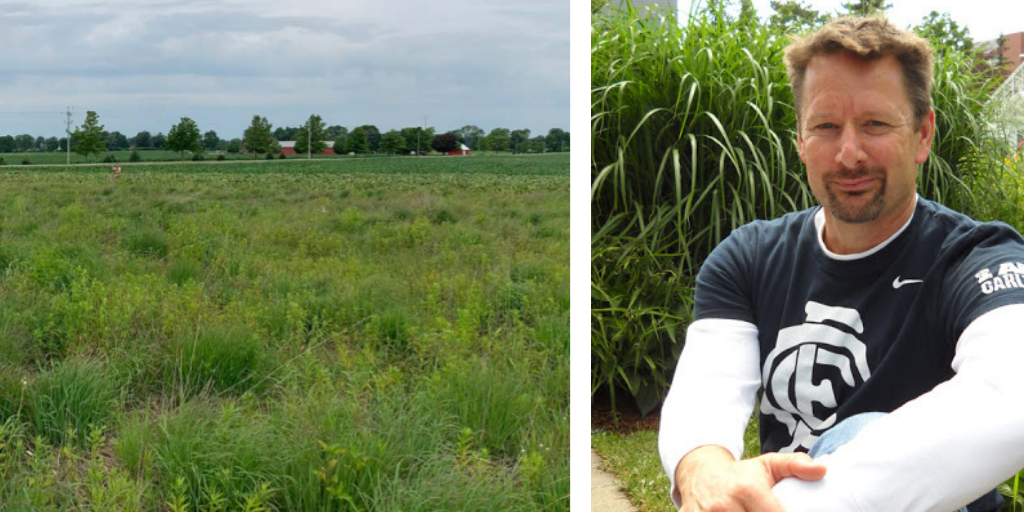University of Guelph researchers are working directly with farmers to quantify how their ecologically beneficial practices can protect the environment and fight climate change without adversely affecting – and sometimes while boosting – their bottom lines. “There is a range of solutions including carbon sequestration, improving biodiversity and retaining nutrients on the land,” says Dr. Andrew MacDougall, a professor in the University of Guelph’s Department of Integrative Biology.
The ALUS Effect
With funding from the Food from Thought program, MacDougall and his team have been working with ALUS (named for the alternative land use services pilot project that launched it) to provide scientific proof of how beneficial practices positively affect the environment on 22 farms across Southwestern Ontario.
ALUS is a non-profit organization that helps farmers and ranchers with technical assistance and financial
payments to provide ecosystem services such as clean air and water, flood mitigation, erosion control and
wildlife habitat. Its New Acre™ project helps companies like Danone, Cargill, TD Bank and A&W Canada meet their environmental sustainability goals by investing in project acres for which farmers and ranchers receive compensation for maintaining natural areas on their land. As one example of how his research is used, MacDougall says he and his team worked with ALUS and Danone to estimate how much carbon was being sequestered through its 90-acre investment.
ALUS initially contacted MacDougall in 2013 to measure the environmental services that would be
provided by retiring marginal farmlands and instead implementing nature-based solutions that promote biodiversity and crop resilience. They started with pollinators but have moved into understanding how these lands better retain nutrients like phosphorus and nitrogen, as well as conducting wetland research
and wildlife habitat studies.
“ALUS provides payments to farmers to offset the costs of taking the land out of production that approaches break-even,” he says. “That marginal land is also the most expensive on which to grow crops because it’s not as productive, so farmers can direct those savings into making the good land better while also providing society with a range of environmental benefits from their ALUS projects.”
Student Scientists Help
Among the researchers studying in the field is University of Guelph graduate student Aleksandra Dolezal, who has been working with ALUS for the past three years. She is a Highly Qualified Personnel scholar under a program that supports the development of highly skilled graduates to bring leadership to the agriculture and food sector. The program is funded by Food from Thought and the Ontario Agri-Food Innovation Alliance, a partnership between the University of Guelph and the Ontario Ministry of Agriculture, Food and Rural Affairs.
Dolezal recently published her master’s thesis called “Restored marginal farmland benefits arthropod diversity at multiple scales.”
“Taking marginal lands out of production is one of the best things farmers can do – there are areas where the soil fertility is poor and where the tractors can’t get around the edges of the field, so it’s easy just to leave it alone and plant it with prairie grasses which are drought-resistant,” she says, adding that these grasses can also be mown and fed to livestock.
Dolezal investigated insects in the population that lives in the naturalized land. “What we’ve found is that while you do get herbivorous species, you don’t get the pests that adversely affect crops,” she says. The land attracts mostly pollinators looking for food.
She says that on the farms she has studied, an average of almost 10 percent of the land has been taken out of production – some have done more and some have done less, depending on the individual farmer.
“It didn’t matter how old the prairie was or what size it was, in every case it produced beneficial insects within the first planting year,” she says. Dolezal says working directly with the farmers was an enjoyable experience.
“They still contact me and send me pictures of bugs and ask me to identify them,” she says. They’re curious and
they love research, so I sent them the lab reports as soon as we got them.”
By providing solid research and data for both large companies and individual farmers, MacDougall’s team is moving the yardsticks on protecting both the environment and farmers’ incomes.
This story is a part of the 2020-21 Food from Thought Annual Impact Report


